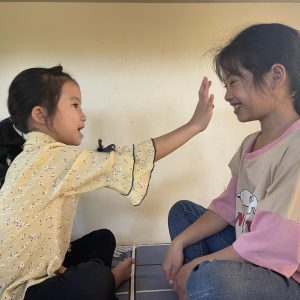On the outskirts of the Rigo Province in Papua New Guinea, Rogai 45-years-old, is giving children in his village the best education he can. Ragai is a dedicated teacher at Ginigolo School and wants all the children in his village to go to achieve higher education and have a bright future.
“I started teaching back in 2003, because I wanted to help grow the school so the children could learn,” he said.
ChildFund Papua New Guinea (CFPNG) began working with Ginigolo school in 2018. The school of approximately 300 students and six teachers is part of a five-year program to build the capacity of teachers and improving the outcomes for children. So far, the program has supported 252 teachers across the Rigo and Central Provinces.
Although all teachers complete their formal education, many do not have access to long-term professional development opportunities. The CFPNG program offers a variety of training and mentorship opportunities to support teachers to become better educators.
“There were only two teachers here before, for all the children. But slowly things have started to improve. Now we have six teachers and five classrooms.”
Ragai took part in the CFPNG training to upskill their teaching skills in classroom management, curriculum development, literacy and numeracy skills, teaching art and physical education. After the training, Ragai joined a Teacher Learning Circle (TLC) group with other teachers in his province.
“The TLC groups brings more ideas to the school. We all come together and share. The school is now two or three levels better than before.”
The TLCs are a way for teachers to come together, identify their needs, skills, and come up with creative ways to overcome the challenges they are facing. They organise monthly meetings after school or the late afternoon that run for up to two hours. Some teachers in his group travel up to two hours to attend.
“The TLCs also helped us learn more about classroom management. Before, the kids would come and run around, but now they know how to behave in a classroom and what is expected of them when they come here to learn.”
The program worked with teachers from participating schools to setup a WhatsApp group chat where the teachers can share different ideas and ways of working. They also use this as a group chat to celebrate each other’s successes.
Together, teachers learn and exchange new techniques for teaching, how to manage a classroom, and discuss how they can improve learning outcomes for their students. Peer to peer learning is one idea from this group that has been successfully implemented in the classroom.
“Peer to peer education is really effective. Sometimes I pair one who can read well with one who doesn’t read as well so they can help each other. The students are doing a lot better in reading and writing than in some other schools around here.”
Ragai is passionate about teaching, explaining that he has a personal connection to this school. “I love seeing the children continue to learn. My son went through this school, and now he is in his second year of a business degree. I want that for the other children too.”
Ragai is optimistic about the changes he is seeing and what this means for the future of the children in his village. “Seeing the children grow up. That’s my favourite thing. And then seeing what they go and do. They’ll go off but when they see you, they say that’s my teacher. They always come back to say hi.”
With support from other teachers and CFPNG, learning outcomes for children are improving. “The constant support and mentoring from the CFPNG staff have been very helpful. With this support, the schools are changing bit by bit. The parents are more supportive and care more about their children’s education.”








